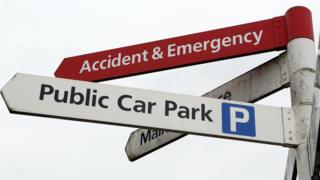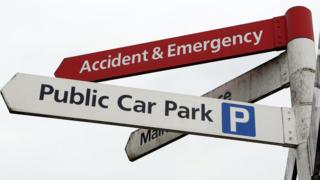A third of hospitals ‘increased parking charges’
Income from fees jumps 10% in a year, with hourly charges of up to £4 levied. …

 Image copyright PA
Image copyright PA A third of hospitals in England put up car parking charges last year, with total income rising by a 10th, an investigation shows.
The Press Association used the Freedom of Information Act to obtain data from more than 140 NHS trusts.
The responses showed £254m had been raised during 2018-19 – up from £232m the year before, with hourly charges varying between £4 and £1 for an hour.
A survey carried out for PA also showed dissatisfaction with charges.
The poll of more than 7,800 people found 86% said parking added to the stress of their hospital visit.
Respondents described the fees as a “rip-off”, “extortionate” and “astronomical”.
But people were split over whether charges should be scrapped or not.
Labour has proposed ending hospital charges, while the Tories have proposed free parking for those with the greatest need, including disabled people, parents of sick children staying overnight and those regularly needing appointments.
What are the parties promising you?
Here’s a concise guide to where the parties stand on key issues like the environment, Brexit and the NHS.
Car parks are largely free in Scotland, Wales and Northern Ireland.
The Patients Association said parking should be free.
“Charges for car parking at hospitals are a charge on people who are unwell, levied on them because they are unwell,” it said.
“We believe that patients should not be effectively charged for being ill.
“Practical arrangements to prevent car parks being used by other motorists can and should be installed, as they are at supermarkets, hotels and so on.”
Patient care
But Saffron Cordery, of NHS Providers, which represents health managers, defended the charges.
“Car parks are expensive to run for the trusts that own them,” she said.
“Parking facilities must be maintained, lit well, and secure.
“All charges by trusts for parking cover the day-to-day running of car parking at the hospital, with any surplus reinvested back into wider services for patients or improving these facilities.”
Abolishing charges would mean trusts would have to find funding from elsewhere, which could “impact on patient care”, Ms Cordery added.

